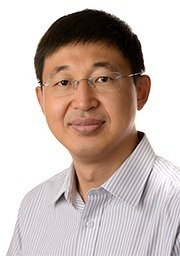
2025 2nd International Conference on Informatics Education and Computer Technology Applications (IECA 2025)
Speakers
| Prof. Yonghui Li (ARC Future Fellow, Fellow IEEE)The University of Sydney, AustraliaYonghui Li is now a Professor and Director of Wireless Engineering Laboratory in School of Electrical and Information Engineering, University of Sydney. He is the recipient of the Australian Research Council (ARC)Queen Elizabeth II Fellowship in 2008 and ARC Future Fellowship in 2012. He is an IEEE Fellow. His current research interests are in the area of wireless communications. Professor Li was an editor for IEEE transactions on communications, IEEE transactions on vehicular technology and guest editors for several special issues of IEEE journals, such as IEEE JSAC, IEEE IoT Journals, IEEE Communications Magazine. He received the best paper awards from several conferences. He has published one book, more than 300 papers in premier IEEE journals and more than 200 papers in premier IEEE conferences. His publications have been cited more than 20000 times. Speech Title: Beyond 5G towards a Super-connected World Abstract: Connected smart objects, platforms and environments have been identified as the next big technology development, enabling significant society changes and economic growth. The entire physical world will be connected to the Internet, referred to as Internet of Things (IoT). The intelligent IoT network for automatic interaction and processing between objects and environments will become an inherent part of areas such as electricity, transportation, industrial control, utilities management, healthcare, water resources management and mining. Wireless networks are one of the key enabling technologies of the IoT. They are likely to be universally used for last mile connectivity due to their flexibility, scalability and cost effectiveness. The attributes and traffic models of IoT networks are essentially different from those of conventional communication systems, which are designed to transmit voice, data and multimedia. IoT access networks face many unique challenges that cannot be addressed by existing network protocols; these include support for a truly massive number of devices, the transmission of huge volumes of data burst in large-scale networks over limited bandwidth, and the ability to accommodate diverse traffic patterns and quality of service (QoS) requirements. Some IoT applications have much stringent latency and reliability requirements which cannot be accommodated by existing wireless networks. Addressing these challenges requires the development of new wireless access technologies, underlying network protocols, signal processing techniques and security protocols. In this talk, I will present the IoT network development, architecture, key challenges, requirements, potential solutions and recent research progress in this area, particularly in 5G and beyond 5G. |
Prof. Li Qing (Fellow IEEE)The Hong Kong Polytechnic University, Hongkong, ChinaQing Li is currently a Chair Professor (Data Science) and the Head of the Department of Computing, the Hong Kong Polytechnic University. Formerly, he was the founding Director of the Multimedia software Engineering Research Centre (MERC), and a Professor at City University of Hong Kong where he worked in the Department of Computer Science from 1998 to 2018. Prior to these, he has also taught at the Hong Kong University of Science and Technology and the Australian National University (Canberra, Australia). Prof. Li served as a consultant to Microsoft Research Asia (Beijing, China), Motorola Global Computing and Telecommunications Division (Tianjin Regional Operations Center), and the Division of Information Technology, Commonwealth Scientific and Industrial Research Organization (CSIRO) in Australia. He has been an Adjunct Professor of the University of Science and Technology of China (USTC) and the Wuhan University, and a Guest Professor of the Hunan University (Changsha, China) where he got his BEng. degree from the Department of Computer Science in 1982. He is also a Guest Professor (Software Technology) of the Zhejiang University (Hangzhou, China) -- the leading university of the Zhejiang province where he was born. Speech Title: KCUBE - A Knowledge Graph University Curriculum Framework for Student Advising and Career Planning Abstract: Knowledge representations and interactions are at the forefront of teaching, learning, and career planning activities in all endeavors of education and career development. University students are increasingly faced with a myriad of interdisciplinary topics that are seemingly unrelated when unstructured knowledge representations are presented, especially during advising and career orientation sessions. This is especially challenging in fast-changing technical domains such as Computer and Data Science where university curricula are reviewed on an annual basis. This makes it increasingly difficult for instructors and administrators to present both the big picture as well as the detailed knowledge components of degree programs to students when choosing a career or establishing a plan of study and assessment. This paper introduces the KCUBE project, a virtual reality knowledge graph framework for structuring and presenting both the overall view of the Computer Science curriculum taught in the Department of Computing at the Hong Kong Polytechnic University as well as the scheduling alternatives in managing course content and presentation views by instructors and students. We employ computational information storage and retrieval methods, machine learning, and interactive virtual reality to better understand, manipulate, and visualize abstract concepts and relationships in the development of teaching and learning activities in our department. |
|
| Prof. Vladan DevedzicUniversity of Belgrade, Faculty of Organizational SciencesSerbian Academy of Sciences and Arts, SerbiaVladan Devedzic is a Professor of Computer Science and Software Engineering at the University of Belgrade, Faculty of Organizational Sciences, Belgrade, Serbia. He has authored/co-authored more than 390 research papers, published in international and national journals or presented at international and national conferences, as well as six books on intelligent systems and software engineering. He has also given more than 20 invited talks, keynote talks and plenary talks at international conferences, as well as more than 20 tutorials. His international research cooperation and collaboration record includes universities and research institutes from EU, USA, Canada, Japan, Australia, New Zealand, India and China. Since 2021, he is a Corresponding Member of the Serbian Academy of Sciences and Arts (SASA). His long-term professional objective is to bring close together ideas from the broad fields of Artificial Intelligence / Intelligent Systems and Software Engineering. His current professional and research interests include artificial intelligence, programming education, software engineering, intelligent software systems and technology-enhanced learning (TEL). He is the founder and the chair of the GOOD OLD AI research network. Speech Title: Teach your children well – it's rAIning all over the world Abstract: Everybody's doing AI today (or at least they say so). The spectrum of AI stakeholders spans virtually all domains, and ranges from researchers, developers and companies, to educational institutions, educators and their students, to all kinds of end users, organizations, decision makers, government bodies, to society at large. This situation calls for changes in how education is delivered, at all levels. There is a continuous debate about it, and this talk is a contribution to it. It makes suggestions on what to teach students about AI, how to teach them, and when to teach them, with the ultimate objective to offer them a realistic picture of AI. To this end, many questions arise, like: What foundational knowledge exactly is necessary for students at different levels of education in order to understand AI properly? In addition to teaching the fundamentals, providing examples of using AI technology in practice, and having the students do AI projects or use AI in their projects, should we also openly teach about misuse and abuse of AI technology, and to what extent? What are the implications of this undeniable and rapid growth of AI technology? What kinds of risks and threats of AI are the ones that educators should really focus on in the class? |
Prof. Dayang N. A. JawawiUniversiti Teknologi Malaysia, MalaysiaShe is a professor at the Faculty of Computing, Universiti Teknologi Malaysia (UTM). She has been an academic staff member at UTM since 1997 and served as the Head of the Software Engineering Department from November 2009 to January 2015, and as Deputy Dean (Academic) and Associate Chair (Academic) since 2017. She is also a Professional Technologist certified by the Malaysia Board of Technologists (MBOT). Her research areas include software reuse, software quality and testing, software cost estimation, and computing education research. Most of her research projects focus on educational robotics, programming and software engineering education, and real-time embedded system applications. Speech Title: Teaching Computational Thinking and Programming Through Robotics-Driven Learning Abstract: As the digital age advances, computing education has become crucial, emphasizing programming, data analysis, and Computational Thinking (CT) at all levels. However, teaching programming and CT varies between university and school settings due to differences in material complexity and student challenges. To bridge this gap, a collaborative learning approach is proposed, where students work together on robotics programming tasks, deepening their understanding of programming and CT concepts. Robotics-Driven Learning is a practical, hands-on tool for teaching subjects such as mathematics and programming across all educational levels. By incorporating a Co-curricular Service Learning (CSL) model, this approach promotes university outreach, supporting computer education in schools and fostering collaboration through robotics-based programming competitions. Mobile robot problem-solving enhances these activities, providing real-world applications that make abstract concepts more tangible for students. This approach aligns with Computing Education Research, focusing on effective teaching strategies across diverse educational contexts. The presentation will cover robotics-based curriculum design, overcoming challenges, and inspiring students to pursue careers in technology and engineering while exploring the future potential of educational robotics in computing education. |
|



